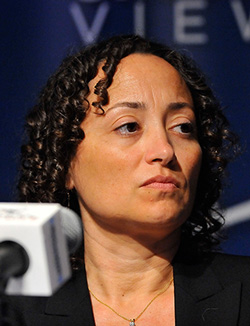‘I Don’t Want Any Light Shining on Our District:’ Schools Serving Undocumented Kids Go Underground
Fearing Trump’s immigration dragnet, educators and advocates are policing their speech, scrubbing their websites and encrypting their conversations.
By Jo Napolitano | July 1, 2025This story was published in partnership with The 19th News, an independent, nonprofit newsroom reporting on gender, politics and policy.
Schools and other organizations serving undocumented students are taking their activities underground, fearful of revealing all they do to help newcomers navigate life in America — lest they be targeted and shuttered by the Trump administration.
Some have asked staff to use secure messaging systems like Signal instead of text and email to keep sensitive conversations from public reach. Others say such discussions should happen only over the phone.
A few are reconsidering the distribution of once-standard know-your-rights cards, afraid they could overstep some unclear federal boundary about immigration enforcement, while others are scrubbing the names and locations of their sites from the internet.
No matter the strategy, the goal is the same: avoid federal audits, funding cuts and closures that could be prompted by their work with undocumented students and families, but also the administration’s edict against diversity, equity and inclusion.
“Because of the threats from the federal administration about revoking the 501(c)(3) status of nonprofits, we want to keep ourselves from being targeted,” said one man who asked not to be identified because he works for an organization that serves undocumented youth.
Groups like his can lose their IRS status, which allows them to collect tax-deductible donations, if they engage in political activities. For this reason, he said, they are carefully policing staff members’ speech in public and in private. Political discussions or commentary on social media are forbidden.
“Anything that could be perceived as obstructing or challenging federal immigration policies, we don’t put in writing,” he said. “Anything that could be seen as a criticism of the administration — or anything that could be seen as partisan — we’re going to completely avoid.”
An administrator for a small Illinois school district that serves mostly Hispanic children said that while it still provides help to all families — including connecting them to rental and tax-preparation assistance — staff are more guarded about publicizing their efforts. Any high-profile association between the school and these types of services can be a flag to their families’ immigration status.
“We’re not trying to draw attention,” she said, asking that she not be identified in order to protect her students. “I don’t want any light shining on our district.”
Her fears around immigration were heightened in February, she said, when she received two letters addressed to her office from the Department of Homeland Security, asking for the whereabouts of two children.
“I ignored them,” she said. “I just pretended like it didn’t happen. I did not respond in terms of providing the information and so far, nobody has followed up.”
Those early efforts took place just weeks after Trump returned to office and are among the administration’s first known attempts to target and locate undocumented children. Reports of federal agents undertaking welfare checks on young immigrants who crossed the border unaccompanied did not surface until months later.
Some of those visits have led to their parents being detained and, in some cases, arrested. Hundreds of kids, their caretakers hauled away, have been placed in government custody in recent months.
Many schools, including the one in Illinois, are curbing the use of words like “diversity” and “equity,” in all their communications. They’re worried they could be accused of obstructing the law: Trump has likened the use of these terms — “inclusion” among them — to a type of indoctrination he will stamp out by withholding the offending group’s funding.

These schools and advocacy organizations are also barring staff from participating in protests or rallies related to immigration — or student detainment.
And they said school-sponsored events, like a normally well-attended spring family night for the parents of English learners, have been nearly empty — or worse, cancelled — since Trump took office and immigrants avoid large gatherings.
Catherine Lhamon, executive director of The Edley Center on Law & Democracy at the University of California, Berkeley, argued that now is not the time to retreat. Lhamon, the head of the Education Department’s civil rights division during both the Obama and Biden administrations, said efforts to avoid Trump’s dragnet have proven futile.

“The impulse to keep your head down and hope that you will escape notice has been demonstrably ineffective during the first months of the Trump administration,” she said. “Fulfilling your mission, doing the things that took you to this work, standing for your principles, that’s what each of us should do.”
Lhamon said, too, that discouraging staff from speaking out publicly in defense of their students erodes the bond between the two.
“It also strikes at the core component of schooling, that is to teach people how to think critically, how to question authority,” she said. “That is the function of schooling. Curtailing that is a mistake.”
And while Trump has threatened Harvard University with the loss of its 501(c)(3) status, the Nonprofit Alliance notes his powers are limited, although House Republicans are seeking their expansion.
Whether Trump’s threats are idle or actual, their impact has changed how immigrant-focused entities operate.
Barbara Marler, a long-time educator-turned-consultant in Illinois, has worked with newcomer students for decades. She’s now offering school districts and other education-focused clients the option of combing through their records to find and erase any DEI-related terms an AI bot could flag as troublesome.
Such wording could trigger Freedom of Information requests that Marler described as “nefarious” and one school administrator, already inundated by them, deemed harassment.
“Never, in my career of over 40 years, have I felt the need to do this,” said Marler, adding that a majority of school districts in vocal, right-leaning communities feel compelled to adopt these precautions. “They want to do right by their [English learners], but are worried that legal challenges would bankrupt them in the worst-case scenario — or board meeting harassment would be triggered in the best-case scenario.”

Alejandra Vázquez Baur, a fellow at The Century Foundation, a progressive think tank, and director of the National Newcomer Network, notes most of the people who work for organizations that serve immigrants want to draw attention to children and families who’ve historically been cast aside.
“We know exactly what it feels like to feel ostracized by a system that was not built for us,” she said. “We come into this work to amend that. And so the reality of the situation at this moment is heartbreaking. We do not join these fields to mince our words and hide our intentions.”
Some groups, including those that operate inside immigrant-friendly states or cities, with big budgets and robust legal defense, might feel emboldened to push back, she said. But small organizations, particularly those run by immigrants, who might themselves be undocumented or whose staff have mixed status, can’t afford that risk.
Trump himself was forced to close his own 501(c)(3), a private foundation established in 1987, as part of a 2018 settlement after his family was found to have used money earmarked for charity to further the president’s political campaign. Trump, who was ordered to pay $2 million in damages, called the investigation “harassment.”
Antero Godina Garcia, professor at Stanford University’s Graduate School of Education, said even a public retreat in name only by those groups that serve immigrants marks a loss for the community. He worries that it will shrink these organizations’ reach and the families they assist will have fewer places where their identities are recognized and affirmed.
“It is not just less services and opportunities for these communities, but also a broader erosion of how individuals can see themselves as valued within the social fabric of this country,” he said.
But the man who works for the organization serving undocumented youth, who voiced concern about preserving its tax-exempt status, said it’s difficult to determine what types of comments or activities are considered over the line by the Trump administration.
“It gets complicated because things that we think are normal and are legal, such as offering know-your-rights training, the administration could easily perceive that as obstructing their policies, making them hostile to us,” he said.
As for the written footprint, Marler, who has attended numerous conferences on how best to serve multilingual learners, has observed a telling shift in the types of in-class translating applications marketed to teachers. These tools were long promoted for their ability to keep records, allowing educators to go back and examine communications over time to learn more about students and families.
Now, Marler said, those same companies are marketing privacy.
“One of their top-selling points was there was no record of the material that was translated,” she said — so communications couldn’t be subpoenaed or subjected to public records requests. “Now, that is their sales point.”
Get stories like these delivered straight to your inbox. Sign up for The 74 Newsletter

